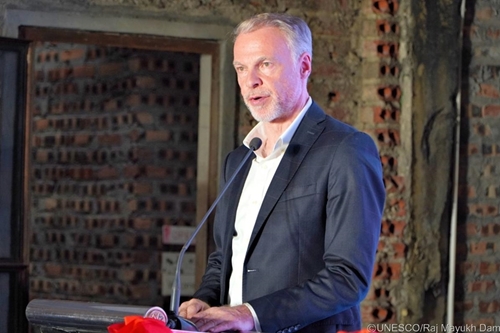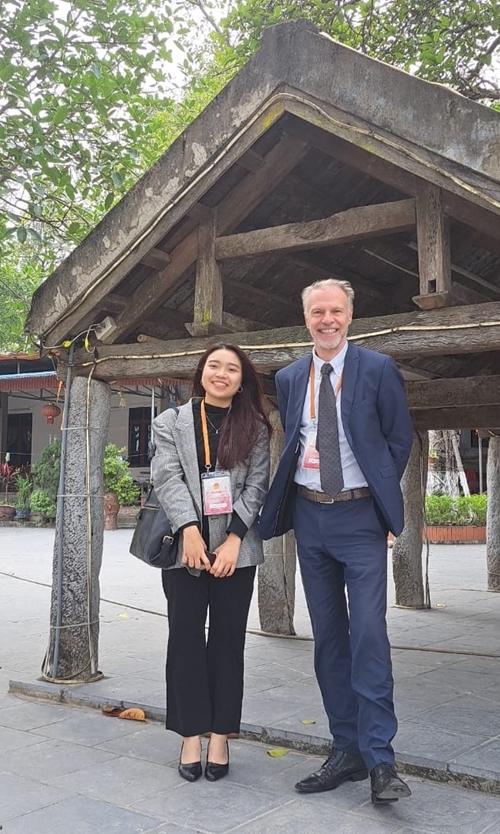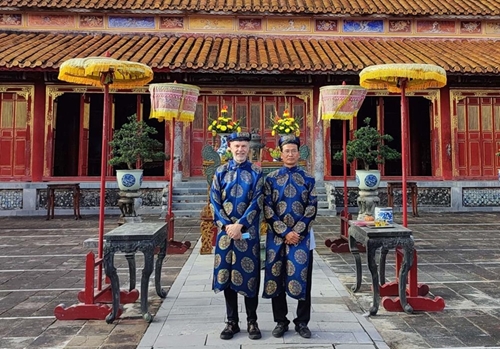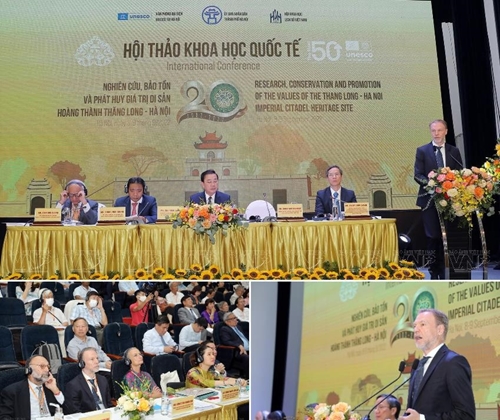The online edition of the People’s Army Newspaper would like to present an interview with this diplomat in the following full text.
    |
 |
|
Former UNESCO Representative to Vietnam Christian Manhart speaks at an event. (Photo courtesy of UNESCO/Raj Mayukh Dam) |
Reporter: I have learnt that you have finished your tenure as UNESCO Representative to Vietnam. I’m sure that you have unforgettable memories of Vietnam during your stay in the country. Could you share some of them?
Mr. Christian Manhart: I finished my tenure as UNESCO Representative in May 2023 and take lots of unforgettable memories home. I was impressed by the extraordinary richness and diversity of cultural heritage and nature. I travelled quite a lot in Vietnam and visited outstanding sites, such as Hue, Hoi An, Trang An, Ha Long Bay, Cat Ba Island, Con Dao, Da Lat, Ho Chi Minh City.
I also enjoyed very much living in the city of Hanoi and participate in its vibrant social and cultural life, and frequently visiting the old quarter on my bicycle.
During weekends, I often went with a group of friends trail-running in the mountains close to Hanoi where we experienced the beauty of nature, small villages and lots of fun.
An unforgettable adventure was a 6-day trek in Phong Nha National Park, which is also on the World Heritage List, where we walked through the jungle, climbed mountains, crossed huge natural caves and swam in the caves and lakes, and slept in tents.
    |
 |
|
Mr. Christian Manhart is impressed by Vietnamese's friendliness, courage, hard-working spirit and honesty. (Photo courtesy of Christian Manhart) |
Reporter: What impressed you the most during your tenure in Vietnam?
Mr. Christian Manhart: That is definitely the Vietnamese people, the friendship so many of them extended to me. I was so lucky to meet many Vietnamese from very different backgrounds, of course through my work, and also artists and those from sports. All gave me the impression to receive me with open arms and we did many private activities together, such as going out to restaurants, take some bia-hoi, trekking or trail-running. I am impressed by the Vietnamese way of life, the outstanding joy the Vietnamese shown when they go out, sing and dance, or just sit in a bia-hoi or a street coffee shop. Also their friendliness, their courage, their hard-working spirit and, last but not least, their honesty.
Reporter: As you know, Vietnam has had many heritage elements recognized by UNESCO and the country has done its utmost to preserve and promote them. What is your assessment?
Mr. Christian Manhart: Most of the UNESCO World Heritage Sites are very well taken care of and preserved by the government, the management bodies and the local communities. The Vietnamese have very well understood the positive impact of their heritage, both cultural and natural, which can boost economic and social development of the country. They systematically use heritage for the promotion of tourism, nationally and internationally, and to improve local economy and upgrade national pride. We at UNESCO have the same concerns and objectives, and enjoy a very close, confident and fruitful cooperation with the Vietnamese government in the field of heritage, at the national and local levels.
    |
 |
|
Mr. Christian Manhart (left) in a traditional Vietnamese ao dai (Photo courtesy of Christian Manhart) |
Reporter: What is your advice to Vietnam to promote values of its recognized heritage? In your opinion, what should Vietnam do to take advantage of their heritage to contribute to the country’s cultural, economic development?
Mr. Christian Manhart: The country has done quite a lot of positive activities already. I would recommend for some sites to find a better balance of development on the one side and preservation on the other. I acknowledge that the pressure for infrastructure building, such as roads, hotels, housing etc., is quite high at many of the outstanding sites. But too much construction will modify the sites, take away their original charm and considerably diminish the experiences of visitors and hence destroy the value of the site in the long term. Of course, it is not an easy task to find the right balance. UNESCO stands always ready to assist.
Reporter: The lunar New Year (Tet) is drawing near in Vietnam. Did you really enjoy a traditional Vietnamese Tet here? How was it?
Mr. Christian Manhart: I was so lucky to celebrate Tet with Vietnamese friends and really enjoyed that. I was invited by the Foreign Ministry to their grand Tet celebration for the diplomats, with amazing dragon dance performances, Vietnamese handicrafts demonstrations, Vietnamese typical food and lots of interpersonal exchanges, which I enjoyed.
    |
 |
|
Mr. Christian Manhart takes part in and speaks at an international conference on the Thang Long - Hanoi Imperial Citadel heritage site. Hanoi is the place he really feels at home. (Photo: VNP) |
Reporter: Are you going to visit Vietnam again? If yes, which places and which dishes would you try? Why?
Mr. Christian Manhart: Definitely, I will visit Vietnam again in 2024 and already look forward to that. I will visit Hanoi, where I really feel at home. And will return to Hue, Hoi An, Da Nang and will of course eat the Pho and all kinds of delicious Vietnamese seafood dishes. I must say that I already miss Vietnam and my friends there a lot.
Reporter: What are the three words that you describe Vietnam?
Mr. Christian Manhart: Friendliness: of the Vietnamese people; Culture: the Vietnamese cultural diversity, tangible with monuments, temples, palaces or imperial tombs, as well as intangible with the different styles in music, folk dances, traditions, poems, literature and other cultural expressions from the vast variety of ethnic groups; Ocean: I enjoyed very much Vietnam’s long and beautiful coast line with amazing diversity, from Ha Long Bay over to Da Nang, Hoi An, the Mekong Delta, and islands such as Cat Ba, Con Dao or Phu Quoc.
Reporter: Thank you very much. All the best to you.
MAI HUONG - TRAN HOAI